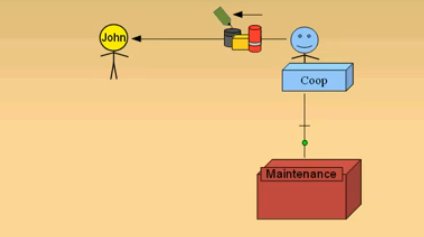This page describes some examples of possible Ripple applications, and their benefits. For instance, interpersonal Ripple can let communities create their own money which more efficiently and fairly represents their own values.
Interpersonal Ripple
The original inspiration for Ripple was LETS, a mutual credit system where users issue new money for each other when it's needed to make a transaction. In LETS, however, users issue new money on behalf of the entire community of users and are not made directly accountable for their decisions. Ripple was originally intended to be an alternative currency system where instead of a single communal LETS, each user would operate their own mini-LETS, which other users could subscribe to at their own peril. The trick then is to route payments through this potentially complicated network of personal LETS currencies...
Suppose Alice and Bob know and trust each other on Ripple, as do Bob and Carol. If Alice wants to buy something for $10 from Carol using Ripple, the system will find a path through Bob. The transaction works like this: Bob agrees to owe $10 to Carol, and Alice agrees to owe $10 to Bob. The end result is that Alice owes a total of $10, Carol is owed a total of $10, and Bob is even overall.
To make use of this Ripple payment, Carol might want to then buy something for $8 from David. The system finds that David is connected to Alice, who is connected to Bob, who is connected to Carol. The transaction goes: Alice agrees to owe $8 to David, Bob agrees to reduce Alice's previous $10 debt to $2, and Carol agrees to reduce Bob's $10 debt to $2 as well. Now Alice still owes a total of $10, $8 to David and $2 to Bob; Bob is even overall, owing $2 to Carol and being owed $2 by Alice; Carol has a positive overall balance of $2; and David has a balance of $8.
Interpersonal Ripple is in many ways an ideal. Instead of depending on labour-intensive legal frameworks to support formal institutional trust, interpersonal Ripple could build on existing informal trust relationships within communities. This should be both cheaper, and allow for a monetary system that better incorporates human and community values.
It would also be more democratic, as it would not depend on central authorities to regulate the money supply and in so doing direct the economy. Deciding when more money is needed for an entire nation involves not only a problem of data collection and analysis, but a whole set of value judgments, and the values of those making the judgments may not always agree with those of the citizenry. If everyone was responsible for issuing their own money, not only would the number of brains gathering and processing economic data multiply million-fold, the values underlying collective monetary policy would accurately reflect all participants in the economy.
Ripplepay is a functioning interpersonal Ripple system.
For more on interpersonal Ripple, see the FAQ.
Local businesses
|
Local Businnesses video |
John buys his groceries at the local food cooperative, and uses a smart card to make a Ripple payment in the store. The Ripple routing system finds that the food coop has a balance owing at the local hardware store where they buy maintenance supplies. The hardware store in turn has an outstanding bill with the lawyer up the street. John often does landscaping for the lawyer on credit. To complete John's payment to the food coop, the Ripple system reduces the food coop's bill at the hardware store, the hardware store's debt to the lawyer, and finally lawyer's debt to John. John walks out with his groceries.
Ripple could enable businesses to avoid taking out bank loans at interest to pay some of their bills while waiting to collect on others. A related topic out of monetary history is the debate surrounding the real bills doctrine.
Non-profit organizations
In addition to the uses individuals can make of Ripplepay, non-profit organizations can track resources such as volunteer hours using Ripplepay. To track volunteer hours, each volunteer would offer the organization credit in the number of hours available. The organization would then pay the volunteer those hours through Ripplepay for the actual hours worked by the volunteer. If the non-profit organization offers any products or services to reward volunteers, then the volunteer could repay those hours to the organization in exchange for the reward.
Businesses
Like non-profit organizations, businesses can track personnel activity and other resources using Ripplepay. Businesses can also accept Ripplepay in exchange for their products.
There are some interesting ways for businesses to use Ripplepay. On top of simple transactions like customers trading Ripplepay credit for products, a business can use Ripplepay to offer and manage customer credit, or to borrow and manage credit with suppliers.
Ripple can enable businesses to avoid taking out bank loans at interest to pay some of their bills while waiting to collect on others.
Co-ops
Any form of co-operative entity such as housing co-ops, production co-ops, intentional communities, and so on, can track their community involvement using Ripplepay. For instance, this could include bills for food or rent, hours for chores, and any other resources.
